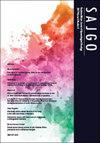Living with the late effects of cervical cancer treatment: a descriptive qualitative study at an academic hospital in Gauteng
IF 0.1
Q4 OBSTETRICS & GYNECOLOGY
Southern African Journal of Gynaecological Oncology
Pub Date : 2015-01-02
DOI:10.1080/20742835.2015.1030890
引用次数: 20
Abstract
Abstract Objective: The late effects of cervical cancer and its treatment are well known. However, qualitative research describing how women experience these effects seems to be unavailable. The purpose of our study was to describe how women experienced the late effects of cervical cancer treatment. Design: A qualitative descriptive design was used. Subjects and setting: Purposive sampling was employed to select the participants treated at an academic hospital in Gauteng. Sixteen in-depth interviews were conducted. Data saturation determined the sample size. Thematic analysis was used to analyse the data. Results: The average age of the sample was 44.1 years, and half of the participants had stage IIB cancer. Most were treated with external beam radiation in combination with brachytherapy. Five themes arose from the data, namely experiencing the physical consequences of the treatment, struggling with the socio-economic implications of the treatment, living with the sexual consequences of the treatment, spiritual issues relating to cervical cancer and facing health system challenges. Conclusion: The late effects deriving from cervical cancer treatment deprived women of the lives they lived before they were treated for cervical cancer. They were burdened with physical changes which aggravated their already difficult financial situation, and they had to live with unattended healthcare needs. Sexual dysfunction changed their intimate partner relationships, leading to anxiety about the possible loss of their life partners. Despite all this, they were positive about their future owing to their faith. Nurses should assess patients for the late effects of cervical cancer and implement interventions to meet their individual needs.生活与宫颈癌治疗的后期影响:在豪登省一家学术医院进行的描述性定性研究
摘要目的:宫颈癌的晚期效应及其治疗已为人们所熟知。然而,描述女性如何经历这些影响的定性研究似乎是不可用的。我们研究的目的是描述妇女如何经历宫颈癌治疗的后期影响。设计:采用定性描述设计。对象和环境:采用有目的抽样方法选择在豪登省一所学术医院接受治疗的参与者。共进行了16次深度访谈。数据饱和度决定了样本量。采用主题分析法对数据进行分析。结果:样本的平均年龄为44.1岁,一半的参与者患有IIB期癌症。大多数采用外束放射联合近距离治疗。数据产生了五个主题,即经历治疗的身体后果,与治疗的社会经济影响作斗争,与治疗的性后果生活,与宫颈癌有关的精神问题以及面临卫生系统挑战。结论:宫颈癌治疗的后期效应剥夺了妇女在宫颈癌治疗前的生活。他们承受着身体变化的负担,这加剧了他们本已困难的经济状况,他们不得不在无人照顾的医疗需求下生活。性功能障碍改变了他们的亲密伴侣关系,导致他们对可能失去生活伴侣的焦虑。尽管如此,由于他们的信仰,他们对未来充满信心。护士应评估患者宫颈癌的后期影响,并实施干预措施,以满足他们的个人需求。
本文章由计算机程序翻译,如有差异,请以英文原文为准。
求助全文
约1分钟内获得全文
求助全文
来源期刊

Southern African Journal of Gynaecological Oncology
OBSTETRICS & GYNECOLOGY-
自引率
0.00%
发文量
0
审稿时长
24 weeks
 求助内容:
求助内容: 应助结果提醒方式:
应助结果提醒方式:


